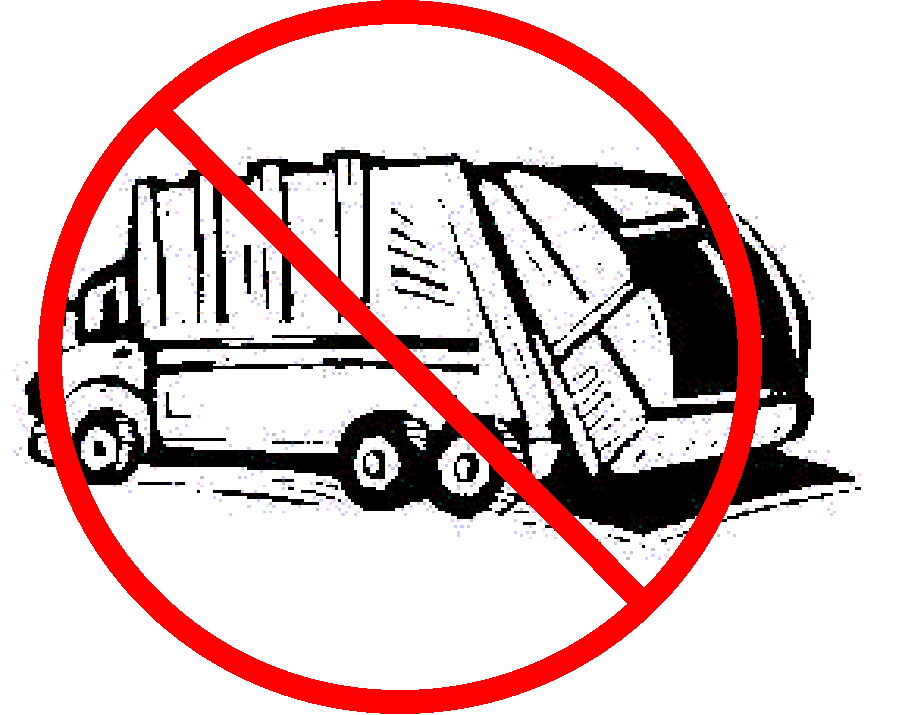
What is NO WASTE?
The Network of Waste Activists Stopping Trash Exports (NO WASTE) is a loose-knit group of committed environmental activists who see the continued transport of solid wastes across state and international boundares as a symptom of our society's short-sighted and arrogant attitude toward managing our natural resources. Certain states, including Michigan, Virginia, Pennsylvania, Ohio, Indiana, and others have become targets for solid waste generated in municipalities throughout the United States and Canada. Because landfills in these states have low disposal (tipping) fees, it has become economical for municipalities far and wide to send their garbage across great distances for disposal in these states. We feel this is a shortsighted approach to waste management, and it discourages more appropriate and "earth-friendly" practices, such as recycling and reuse. Our goal is to educate people about the problem and to direct our governments to address it through legislation at the state and national levels.
NO WASTE came into existence because of a five-year contract between the City of Toronto and Browning Ferris Industries (BFI), which operates a huge landfill in Washtenaw County, Michigan. Beginning in early 1998 and lasting over a period of five years, the City of Toronto started trucking up to 500,000 U.S. tons per year of municipal garbage into Michigan for disposal. BFI is making from $65 to $100 million on this contract alone. The 50% recycling rate that Ann Arbor citizens have achieved has not resulted in saved landfill space for the future but a tremendous profit for BFI! With this cheap disposal option, Toronto citizens certainly have no incentive to improve upon their approximate 20% recycling rate.
We have chosen this insidious example to highlight the bigger picture problem that exists in Michigan and elsewhere. This is not a single occurrence. Ask the people in Virginia how they feel about the garbage from New York City and you will get the same response that you get from folks in Ann Arbor when asked about Toronto.
What is the problem?
You may ask, what's the big deal? As you can imagine, tremendous amounts of garbage are generated on a daily basis throughout the U.S. and Canada. Over the past few years, many people and municipalities have taken it upon themselves to recycle much of the waste they generate. For example, the City of Ann Arbor, Michigan's recycling rate is currently over 50%! Because of this many landfills have not reached capacity as soon as expected. In addition, in many states, landfill-siting requirements have become less stringent, resulting in more landfills. The operators of these landfills, (BFI, WMI, etc.) upstanding corporate citizens that they are, have decided to market out this excess space rather than saving it for the future. The end result will be more unnecessary landfills in the future, which will increase the chances of environmental degradation (i.e., ALL LANDFILLS WILL EVENTUALLY LEAK!!) throughout the U.S. and Canada.
What needs to be done?
People need to become aware of what is happening and the laws need to be changed so that it isn't so easy for this to happen. Michigan and other states have attempted in the past to stop out-of-state waste. In a landmark case that reached the U.S. Supreme Court, the justices ruled that waste is a commodity under the Interstate Commerce Clause and therefore cannot be stopped from crossing state lines. To change this, U.S. federal legislation empowering states to regulate the flow of waste is required. Bills have been attempted in Congress in the past, only to die on the vine in the House Commerce Committee. In the 107th Congress, bills have been introduced (HB 1213) and sent to the Commerce Committee. Members of the committee must be made aware that they need to act on this bill. Contact NO WASTE for more information.
In the meantime, representatives of all governments, local, state/provincial, and national, must be made aware of the problem and the consequences. It's unlikely that Toronto or New York really thought of the ramifications when they voted to allow garbage to be disposed in Michigan and Virginia.
Finally, waste management companies are purchasing favors from our legislators through campaign contributions. Their excessive influence purchasing expenditures have been documented in Michigan and at the U.S. federal level. Undoubtedly, this is also happening in other states and in Canada. We must hold our government representatives accountable for their actions!